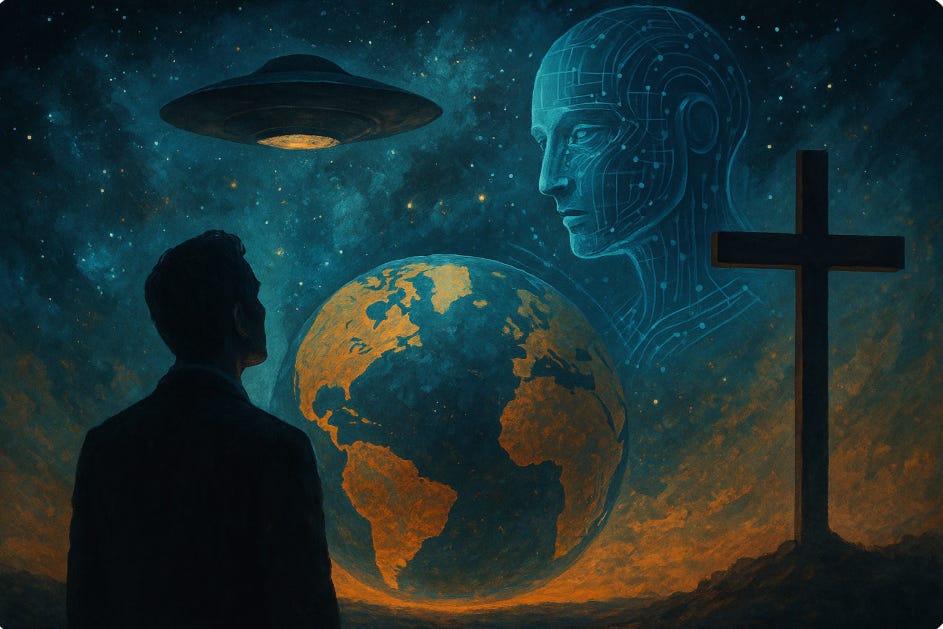This is the addendum to my five part series on the House of Mirrors.
Each part was accompanied by a Youtube video that I recommend watching if you want to understand the larger picture I’m attempting to illustrate.
The added an epilogue and addendum bring this series right up to current events. Thank you in advance for your time and your consideration.
Click here for the introduction, part one, part two, part three, part four, part five. Epilogue. Addendum.
Why We Don’t Believe What We Say We Believe
Christopher Mellon ends his video with a quiet plea: “No issue can be more profound or important.” He’s speaking of the growing body of UAP encounters, official government acknowledgment, and the statistical certainty of intelligent alien life. The argument is delivered with reason, decorum, and a tone of unflinching seriousness.
And yet: almost no one listens.
Why?
Because modernity has forgotten what it means to wonder.
We have theories without theology, intelligence without intention, probabilities without presence. When Mellon tells us the stars are full of life, we nod, scroll, and then forget. It is not because the claim is dull. It’s because it arrives in a moral vacuum. If there are aliens, we ask, what does it change? What do we owe them—or ourselves?
We’ve grown used to spectacle without meaning. And so we shrink back from the implications of encountering beings that surpass us. Not because it’s unthinkable, but because we no longer have a coherent framework in which to think it.
👁️🗨️ The Eyes That No Longer See
In his conversation with Steve Fuller, physicist Brian Keating praised his audience as “the most magnificent and munificent in the known multiverse.” It was a throwaway line. A joke. But jokes often reveal what the subconscious won’t say out loud.
In trying to elevate the intellect of his audience, Keating gestures toward grandeur—but limits it to the known. He speaks of the multiverse, but only the part we can map. He plays with language that suggests richness and generosity (munificence), but still orbits inside a materialist cosmos.
Fuller, catching this inconsistency, replies with another quip: “There’s no causation there… right?” A reference to Daniel Dennett’s death. But also a metaphysical jab. He’s pointing out the absurdity of a worldview that accepts meaning in every cause-effect relationship—except the one at the foundation of everything.
We can measure the stars, but not their message.
We can theorize about aliens, but not about purpose.
We can simulate intelligence, but not the soul.
This is the irony: The more we are flooded with information, the more truth eludes us—not because it is hidden, but because we’ve forgotten what it looks like.
👾 The Alien as Mirror
Mellon is not wrong to suggest that some intelligence might be watching. But what kind of intelligence? He floats the idea of AI probes, Von Neumann machines endlessly replicating across galaxies. But he makes no mention of intent, or ethics, or beauty. He imagines a universe full of minds, but not a single heart.
In doing so, he echoes the quiet tragedy of our age:
We are terrified of discovering that someone is watching us—because deep down, we suspect we are not worthy of being seen.
Modern science fiction is not about aliens. It’s about ourselves. It is an anthropology wearing the mask of astronomy. And the fear it reveals is not technological. It is moral. We fear that when the higher intelligence arrives, it will see us and find us wanting.
Unless, of course, that intelligence is just us—only more powerful, more efficient, more optimized. AI as alien. Algorithm as god. That is the dream. Or the nightmare.
📡 Back to the Logos
What Mellon, Keating, and even Fuller graze against—but cannot quite name—is the Logos. The unifying principle that makes thought possible, life intelligible, and existence meaningful. We’ve argued and humbly submit, that without it, all human efforts collapse into contradiction, scapegoating, or despair.
This is the heart of the House of Mirrors:
Harari sees intelligence as utility.
Reid sees technology as destiny.
Pinker sees reason as beauty.
Neil Oliver sees centralization as a threat—but not its root.
Mellon sees watchers in the sky—but no Creator behind them.
Only Fuller dares to ask if perhaps there is a Voice behind the code. But even he cannot—or will not—name it.
And yet the biblical narrative has named it from the beginning:
In the beginning was the Logos…
And the Logos was not just information. It was a Person.
Seen. Touched. Crucified. Risen.
🌌 Choose This Day
There is no final revelation of alien life, AI sentience, or scientific discovery that will substitute for the internal awakening each soul must face: Are we alone? And deeper still: Are we abandoned?
The Logos says: No.
You are not alone.
You were made.
You are known.
And you are loved.
The House of Mirrors ends at the foot of the Cross. And beyond the shattered reflections, a Voice still speaks:
“Choose this day whom you will reflect.”

